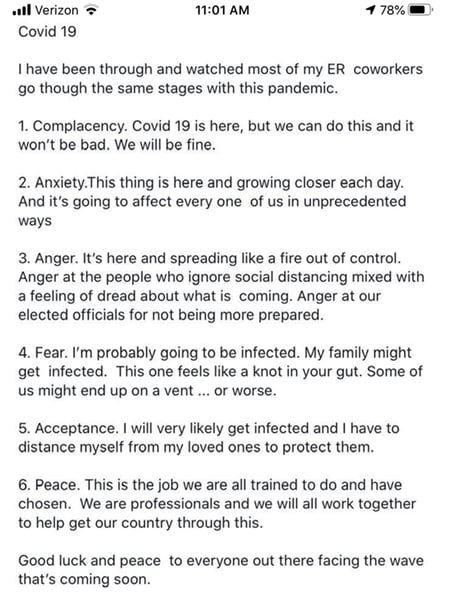

“I wish it need not have happened in my time," said Frodo. "So do I," said Gandalf, "and so do all who live to see such times. But that is not for them to decide. All we have to decide is what to do with the time that is given us.” ― J.R.R. Tolkien, The Fellowship of the Ring
I guarantee many of us have thought something similar to this great quote from The Fellowship of the Ring during these last few weeks. Something along the lines of: “Why, oh, why is this happening to us?”It’s natural and normal to have these thoughts, but, as Gandalf reminds us, we have a decision to make about the time that has been given to us. That decision is conscious, intentional, and crucial, and it will inform the way we’ll move through the coming days and weeks.
Many of us working in healthcare during this time are experiencing legitimate fears – we are worried about contracting COVID-19, about the possibility of becoming infected and then infecting our families. I saw a post earlier this week that I felt perfectly summarized the various levels and stages of emotion we’re all experiencing:

There’s no doubt that the next several weeks are going to be challenging. Many have used the analogy of war to describe the perilous times in which we’re living. In some respects, our reactions to the pandemic are similar to those of wartime reactions, simply because our bodies and minds must find ways to respond to the trauma of change and the constant flow of news we’re receiving. But the analogy is not totally analogous, because, as Americans, the majority of our wars have not placed our families on the front lines. This war will not be so discerning, and it will require us to harness our greatest strengths and to focus in on several key areas in order to come out victorious on the other side.
- Think practically. If you are working on the front lines of the pandemic, take practical steps and follow the recommended personal protection guidelines to reduce worry and fear. Protect your family by practicing distancing and isolation if you may have been exposed. Some healthcare staff are choosing to stay in hotels in between shifts in order to avoid exposing their families, and some healthcare programs are inquiring about donated hotel rooms to accommodate staff. While being away from family during this time is certainly difficult, it is smart to give yourself less things to worry about by following practical precautions.
- Manage your energy. In my recent blog titled Leadership During Times of Crisis, I challenged all of us to ensure the best version of ourselves show up. A couple of days ago, I found myself hard at work for an hour and then lying down for a 30-minute nap. My wife wondered how I could show two extremes in such a short time window. I explained to her that I had to in order to bring the best version of myself to the table. It’s important to know when it is time to bring your “A-game” and when it is time for you to recharge so that you can show up as the best version of yourself when it is most needed. Acknowledge when it is going to be required and manage your time and energy wisely and accordingly.
- Utilize the tools in your organization system. My good friend Mindy Stewart-Coffee reminded me of the importance of our TCN leadership system tools during this time. Profoundly, she said “In times of great challenge, we need to be reminded that a) it is imperative that we lead and b) we have tools to make this easier. Usually stress causes the tools to fly out the window, but the only way to manage through is to manage time and resources effectively.” Of these tools, I’ve highlighted those that are part of the TCN Leadership System that are most important as we navigate the coming days:
- Triage what is coming at you based on the 4-quadrant tool shared in my recent Hero blog (Leadership During Times of Crisis).
- Email “Rules of the Road”:
o Sort and filter via the subject line so that you can see the last email. Many times, you can knock out 10 to 12 emails all at one time just by looking at the last email and quickly scanning the others of the same subject.
o Be discerning about what you review. We at TCN are distilling many, many emails and packing it into one “need-to-know” email we send out daily to our members. This allows our members to not have to focus on an influx of other emails and to review a distilled version that we are sharing. Know your best trusted sources right now and use those. Ignore the rest, your time is worth its weight in gold right now, every minute matters regarding where you are spending your focus.
- Practice “Need-To-Know” Communication: Many leaders are being challenged with the sheer volume of information coming at them. If you are working with one of those leaders, be respectful of their time. If you need to communicate something, be concise and focused in your communication, and practice “need-to-know”, which means “What do they need to know right now to effectively perform their role?”. For those who are processors, announce that is what you are doing so that your intention is clear. In all communication, consider that everyone’s time is extremely valuable so be brief and to the point.
- Effective Meeting Tools. Be sure you have timekeepers, weed whackers, and facilitators in your meetings to ensure you cover the ground in the time you have. Because we all have more to do than what we actually have time for, it’s critical that we “punch above our weight class” with the time we do have, and meeting tools are essential to ensure we aren’t wasting valuable time.
- Management by Strengths (MBS include link to their website). Whether you use MBS or another temperament tool, it’s important to keep in mind our teams’ temperaments, as during times of stress people will default to their natural temperament and it will be amplified. Give grace – we are all going to rub off on each other due to the immense pressure we’re under. Understand we need each type of person playing their role well to get through this and make good decisions.
For many of us, these times bring great clarity to why we got into healthcare. For others, you may feel like you never signed up for this. In my last blog (put link) I shared a quote from my grandfather about his experience in WWII that stuck with me and has been top of mind these last couple of weeks. He said about his time in WWII, “We did not know we were making history; we were just trying to do our job. We were just trying to do the right thing and survive.”
During times of stress, fear, and doubt, pause and remember this is what we’ve been training for. Many people are going to be depending on us. This is why we are in healthcare.
Praying for all our safety in these coming weeks.
Sincerely,
Chris Comeaux, President / CEO of Teleios Collaborative Network

An organizational model that allows not-for-profit hospices (Members) to leverage best practices, achieve economies of scale and collaborate in ways that better prepare each agency to participate in emerging alternative payment models and advance their charitable missions.
Related Posts
What If I Could Give You 10 Additional Years On Your Life, Would You Be Interested?
What if I could give you 10 additional years on your life, would you be interested? Well who...
The 4th Fundamental of Every Great Organization System: The Reference System
Years ago, John Maxwell developed leadership lessons which he distributed via CDs. One of the...
The calendar the 1st fundamental of a great organization system.
The calendar the 1st fundamental of a great organization system. In our last blog we mentioned that...



